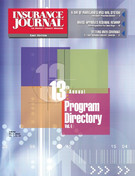The way Stephen Sills sees it, insurance professionals should be glad they are not in the toothpaste business where it’s hard to improve on the product.
“In the insurance industry there is always room for opportunity. This isn’t like toothpaste. The insurance business has not reached an optimal level. It can do better, it can be better, and it can be faster but the mindset has to change.”
Sills, the founder and former chief executive officer of Executive Risk (now a subsidiary of The Chubb Corp.), told the recent annual meeting of the Target Markets Program Administrators Association in Tempe, Ariz.
Today, Sills heads a new firm, Darwin Professional Underwriters, out of Farmington, Conn. His new venture is offering directors and officers liability and errors and omissions coverage.
Sills maintains that his approach to the business has always been to hunt for what he calls “loose bricks”–areas where other companies are not doing as well as they could–and turn them into opportunities for smaller companies that “innovate and move faster.”
In his keynote address, Sills said the industry should focus on some core values, chief among them how it treats its people and how people within it treat each other.
“How did we get here?” he asked the audience. “Most fell into this industry and then liked the people and stayed, but it could use a world of improvement.”
He criticized gaps he said exist between management and employees, between insurers and agents, and between carriers and program managers.
Program managers are “opportunistic and creative” but often carriers just look at them as “gunslingers,” he observed. Too often, after a program becomes successful, a carrier decides it can do it better by itself and breaks with the program manager.
“It’s the same as the management/employee gap in the industry; it drives the bright people out of the company,” he said. “But these gaps can be bridged if we stress accountability and communication.”
He used his own experience after Chubb took over Executive Risk in 1999 to illustrate how the gap between management and employees grows. He said he was convinced at the time that the merger with the much larger Chubb represented a good match for his smaller, entrepreneurial firm but came to think differently as time went on and, he said, Chubb didn’t listen to the Executive Risk people. “After a little time, you begin to hear, ‘Don’t forget who bought whom.'” He likened Chubb to a “giant corpuscle” that kills any foreign entity that enters the body. In retrospect, he says he thinks everyone learned a lesson. “PBS can’t buy MTV and expect it to work,” he quipped.
Was this article valuable?
Here are more articles you may enjoy.


 Florida Engineers: Winds Under 110 mph Simply Do Not Damage Concrete Tiles
Florida Engineers: Winds Under 110 mph Simply Do Not Damage Concrete Tiles  Munich Re Unit to Cut 1,000 Positions as AI Takes Over Jobs
Munich Re Unit to Cut 1,000 Positions as AI Takes Over Jobs  CFC Owners Said to Tap Banks for Sale, IPO of £5 Billion Insurer
CFC Owners Said to Tap Banks for Sale, IPO of £5 Billion Insurer  Insurance Broker Stocks Sink as AI App Sparks Disruption Fears
Insurance Broker Stocks Sink as AI App Sparks Disruption Fears 


